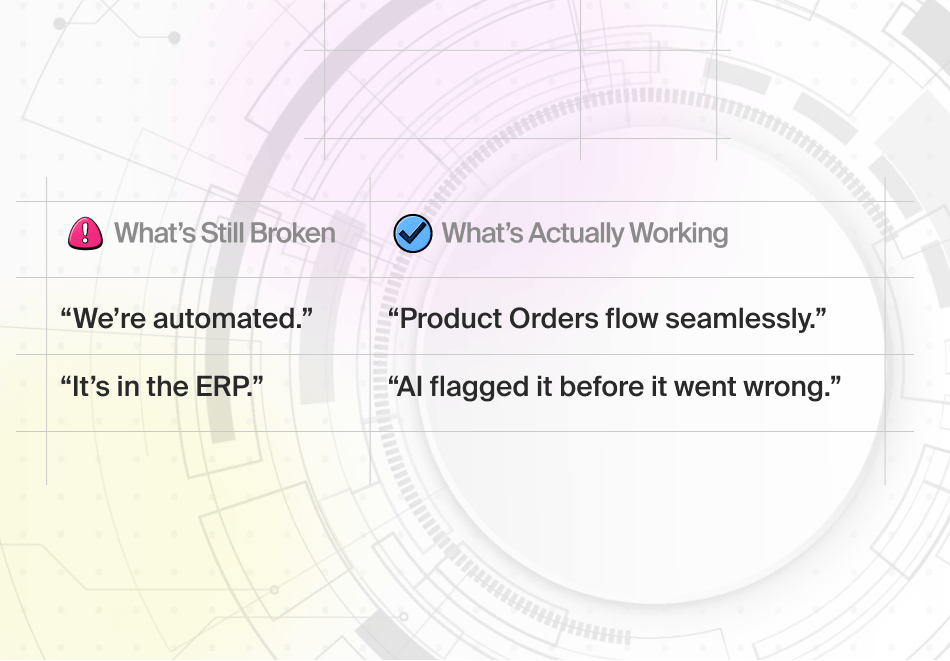In chemical manufacturing, the efficacy of a corporate enterprise resource planning (ERP) framework is one of the most important things businesses focus on. Does your current ERP allow you to effectively manage your operations without needing complicated 3rd-party software? These types of integrations will always be seen as weak links.
This is an area where Microsoft Dynamics 365 shines. With a growing list of robust capacities and functions, D365 gives businesses a clear path to upgrade operational processes, elevate efficiency, and stimulate development.
The first step to ensuring successful implementation is developing an appropriate approach and plan.
In this article, we will detail key reflections and leading approaches to ensuring Microsoft Dynamics 365 works as intended.
Research done by TechValidate revealed that 86% of corporations that used Microsoft Dynamics 365 F&O saw an enhancement in accuracy and completeness of their data. (Source: TechValidate)
Figure 1:Implementing D365 – The Road to Success

Set attainable goals
Establishing realistic business goals is a major step to successfully deploying D365. These goals serve as a fundamental basis to ensure the software’s implementation is specifically tailored to the company’s distinct requirements and needs, thereby enabling the accomplishment of desired results.
To start, any KPIs (Key Performance Indicators) and essential processes for success need to be identified and ordered by priority. Once these objectives have been determined, the appropriate Microsoft Dynamics 365 modules and features that suit the business’s goals can be selected. This step calls for deciding which customizations and integrations are required.
A complete understanding of the company’s objectives and requirements ahead of time makes it easier to determine appropriate timeline expectations and allocate resources accordingly. This lowers the possibility of any unforeseen issues occurring during the deployment process.
Develop a Comprehensive Implementation Plan
Getting Microsoft Dynamics 365 Finance and Operations software up and running can be a complex mission for the uninitiated, with several moving parts that must all come together simultaneously. This includes setting up the modules and features of the software, data migration requirements, system integration, personalization, training, and more. To guarantee a successful implementation, you will want a detailed implementation plan outlining all process stages, timelines, roles, responsibilities, and key milestones.
Producing a detailed implementation plan helps recognize potential issues and hazards that could arise after the process starts. A proper plan helps lessen or prevent untimely postponements, allowing the project to progress as expected.
A thoughtfully drafted plan should lay out all stages of the implementation, including data migration, customization, training, and system testing, setting timelines for every stage of the process, and marking out the essential milestones to permit progress tracking. Assigning roles and responsibilities at every step guarantees resource ownership and effective use.
Choosing the Right Implementation Partner
Ensuring you work with an experienced implementation partner is another essential puzzle piece for a successful deployment of D365.
You want to work with a team that understands your sector, business needs and functional requirements. Your best option is working with Microsoft Partners, with appropriate technical expertise, understanding, and background in implementing Microsoft Dynamics 365 for your unique business type.
A Solution Partner should be able to provide consistent support throughout the implementation. This can range from system configuration and data migration to training and various levels of post-implementation support. An experienced partner will provide important instructions and discernment, enabling you to make wise choices that match your corporate goals.
Develop a Strong Change Management Plan
The implementation of a new ERP system like Microsoft Dynamics 365 is a massive shift for any organization, with a resulting need a successful change management plan to guarantee a seamless transition.
A thorough change management strategy needs to focus on
- Communication,
- Education, and
- Support needs.
A crucial part of handling the shift is communication; timely and open dialogue through the duration of the execution is essential. This can incorporate normal updates, feedback systems, and more opportunities to get input from personnel.
Proper instruction is another fundamental part of making sure employees are equipped with the required information and proficiency to work with the new system. Detailed instructions tailored to the demands of varied user groups – such as supervisors, end-users, and technical personnel – should be provided to each user as soon as possible.
Education should be addressed via several means, including classroom teaching, e-learning, and on-the-job aids.
Developing an effective change management plan that covers communication, education, and support requirements means there should be less resistance to change and helps guarantee your staff is prepared and capable of operating their new system.
Data Migration and Integration
The overall efficiency of D365 relies heavily on the accuracy and completeness of the data in the system. For this reason, some Partners consider it important to devise a separate plan just for data migration and integration tasks.
This plan should identify the necessary data to be migrated, focus on cleaning up any existing data issues, and map migrated data to the right fields of the new system.
This leads to better planning and execution of the integration processes, which includes specifying the systems to be connected, understanding the data flow and mapping, and putting protocols in place to handle data synchronization and transfer.
Performance Monitoring
Microsoft’s D365 Finance and Operations software is a long-term investment needing continuous maintenance to ensure ongoing success. As your business changes and grows, it’s good practice to monitor and assess your implementation to identify improvement areas diligently.
Keeping an eye on your data and KPIs lets you identify patterns, trends, and aberrations that signal regions that need enhancement. You can then address these matters and maximize your processes for more proficiency and success.
This can include frequent checks to guarantee that your new system operates in line with your goals and achieves your set KPIs. As the implementation progresses, you may want to modify your plan to incorporate new features, customizations, and integrations.
Monitoring your performance is just as important as ensuring your software has the most current updates and releases from Microsoft. Keeping your ERP up to date allows it to be validated and compliant.
Final Thoughts
Business success can be defined in several ways, such as achieving financial profitability, positively impacting society, establishing a strong brand reputation, or achieving personal fulfillment.
Regardless of the definition, success in any project can benefit things like job satisfaction, growth opportunities, increased revenue, and the ability to make a difference in the world.
A successful D365 implementation requires forethought, clear business objectives, and an action plan focusing on these objectives. This is where working with a knowledgeable implementation partner can make all the difference in the world, as their insight and knowledge become pivotal for achieving success. Just setting up an effective change management plan to manage data migration and integration and consistently reviewing and refining your implementation will guarantee success in the long term.
Not sure where to begin? Your partner can help you effectively plan and implement Dynamics to enhance your business operations to attain your goals—having trouble finding a partner that understands your needs? Our team can help you understand your options and ensure you are on the right path. Following the proper steps and being fully aware of the available features can help ensure a successful deployment of Microsoft Dynamics 365 and open the door to streamlined processes, boosted productivity, and high-octane growth.








